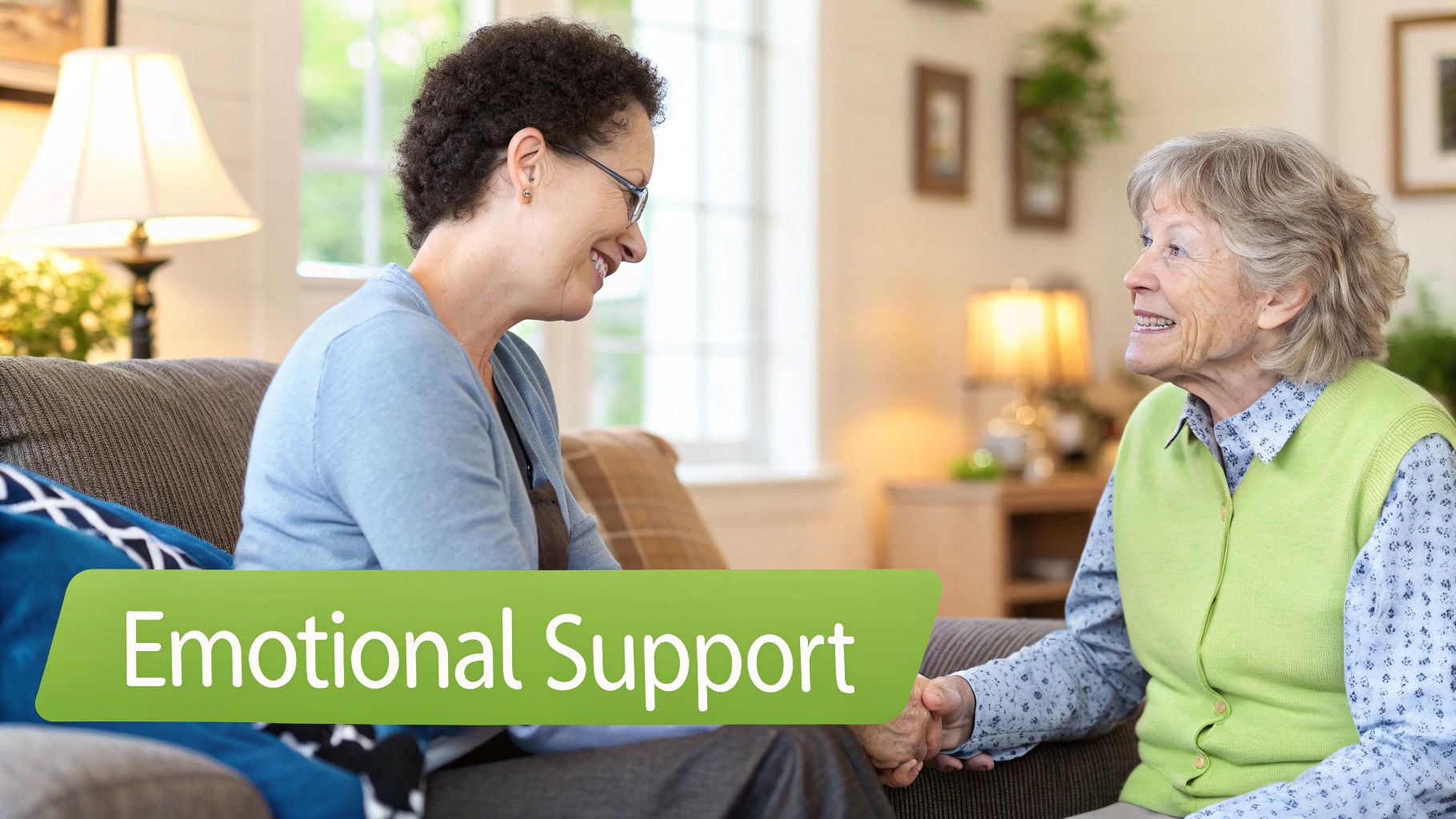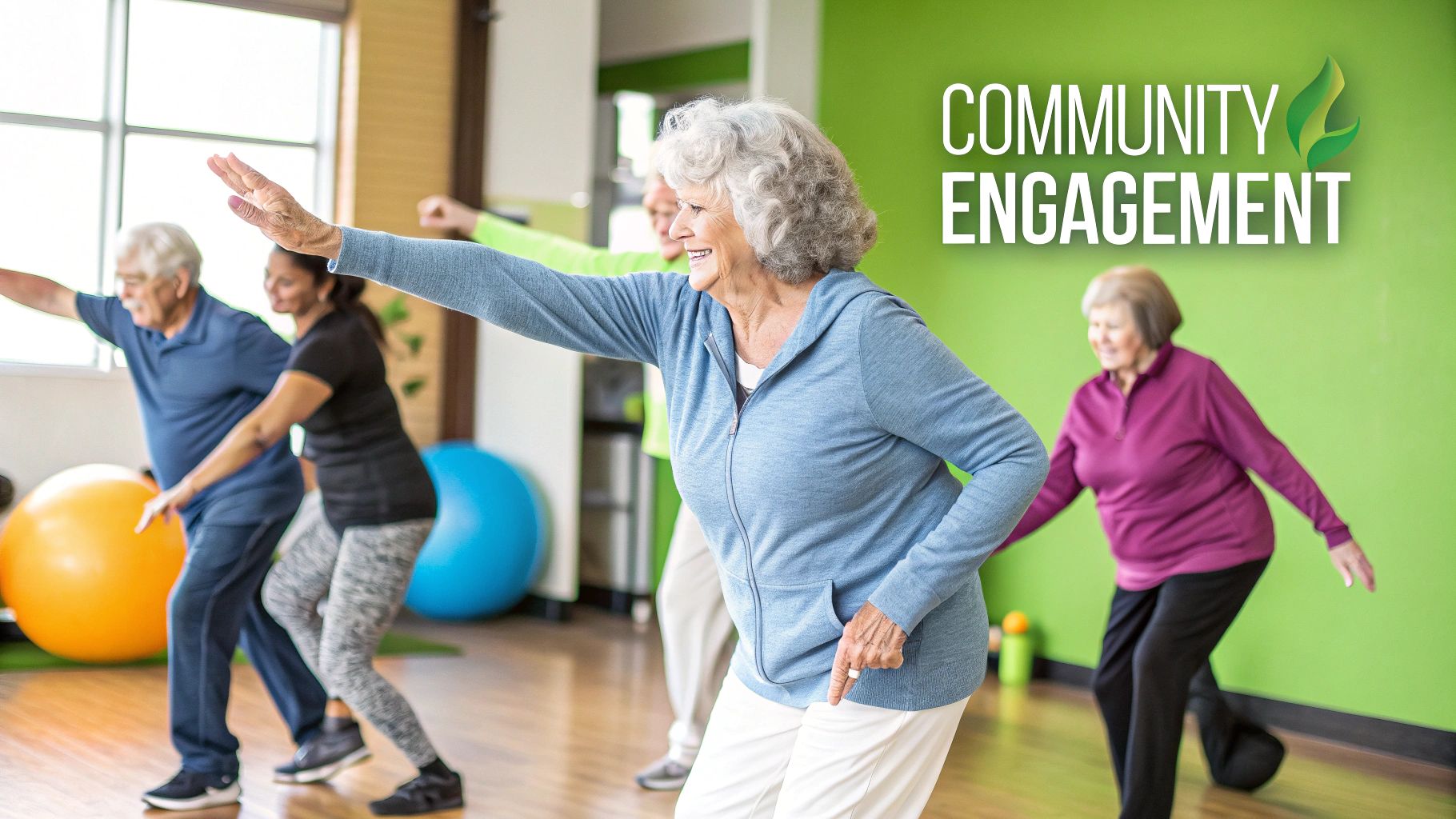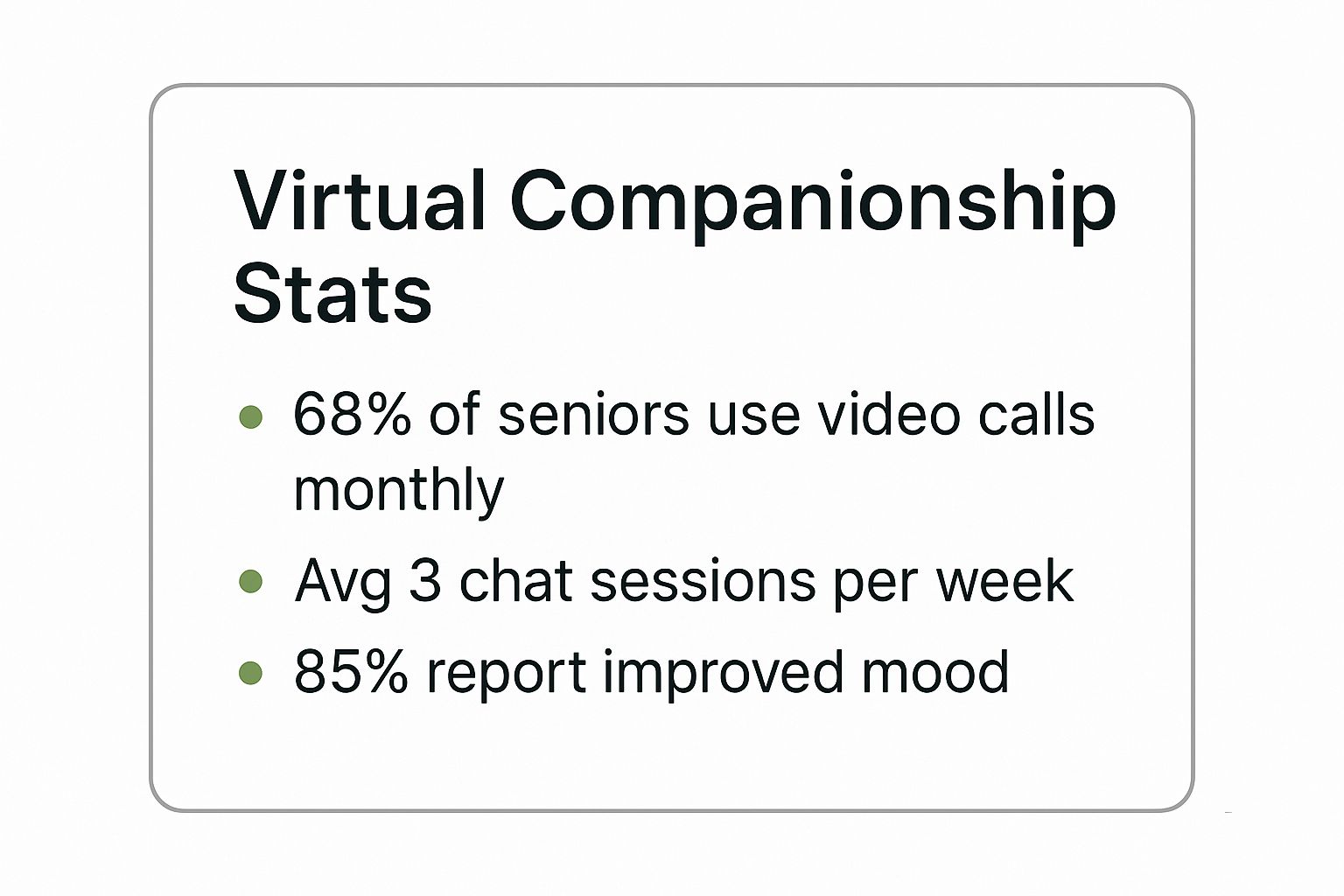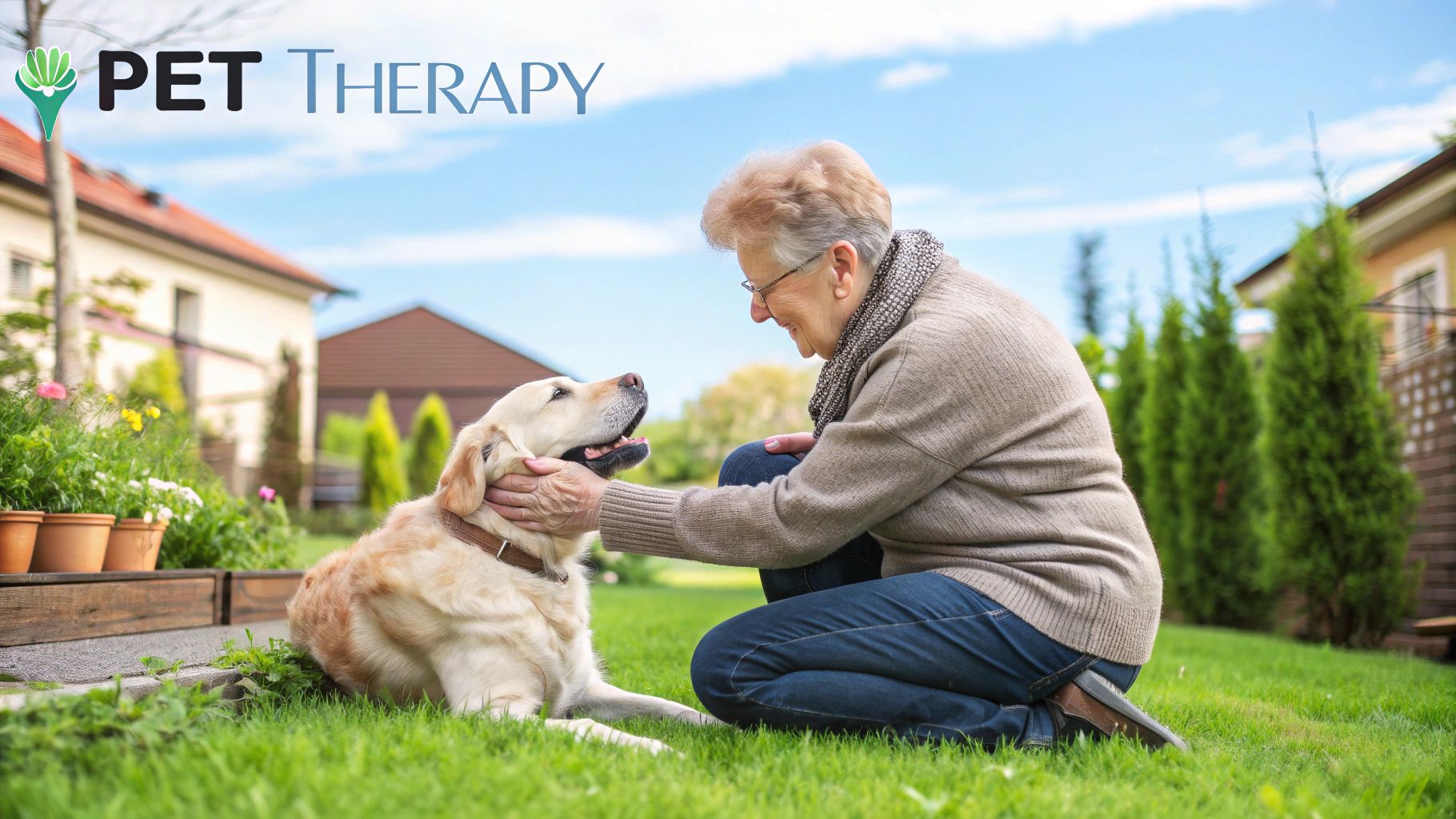When we talk about companionship for the elderly, we're talking about something far more profound than just having another person in the room. It’s about creating a genuine connection that provides emotional support, keeps the mind sharp, and fosters a shared sense of purpose. This kind of care is a direct answer to the quiet epidemic of loneliness, building real relationships through conversation, shared hobbies, and the simple comfort of a reliable presence.
Why Elderly Companionship Is More Vital Than Ever

The need for meaningful companionship for older people has never felt more pressing. Life today often means families are scattered across the country, or even the globe, and the tight-knit community ties of the past have loosened. This modern reality leaves many older adults with quiet days and long, empty evenings.
True companionship goes well beyond ticking off a list of care tasks. It's found in the simple moments: sharing a cup of tea and a story, puzzling over a jigsaw together, or just watching a favourite TV programme in good company. This consistent, positive interaction is a lifeline against the silence that too many seniors face.
The Growing Reality of Living Alone
A look at the UK’s population figures really brings this challenge into focus. A growing number of older adults are living by themselves, which makes dedicated companionship not just a nice-to-have, but an essential service. Between 2003 and 2023, the number of men aged 65 to 74 living alone shot up by a staggering 76%.
For women over 75, the numbers are even more stark: 1.7 million live on their own, compared to 0.8 million men. You can learn more about these demographic shifts and their impact on our ageing population. These statistics highlight a simple but profound truth—we all need human connection, at every stage of life. Without it, our mental and emotional health can suffer.
"Companionship is the essential ingredient that turns a house into a home and existence into a life. For an older person, it can be the difference between merely surviving and truly thriving."
What Meaningful Connection Looks Like
So, what does meaningful elderly companionship actually look like in practice? It’s built on shared moments and mutual respect, and it can take many different forms depending on someone's personality and interests.
- Stimulating Conversation: Chatting about current events, reminiscing about fond memories, or simply sharing thoughts and ideas helps keep the mind active and engaged.
- Shared Hobbies: Getting stuck into activities like gardening, knitting, playing board games, or listening to music together brings a sense of joy and accomplishment.
- Emotional Reassurance: Just having a trusted friend to talk to can provide immense comfort, helping to reduce feelings of anxiety, frustration, or sadness.
- Gentle Encouragement: A companion can be a great motivator, encouraging an older person to stay active with short walks or light exercises, which boosts both physical and mental wellbeing.
Ultimately, arranging companionship for the elderly is an investment in their happiness and overall quality of life. It’s a way of acknowledging their fundamental need for connection, ensuring they feel valued, heard, and far less alone.
The Powerful Health Benefits of Companionship

We often talk about diet and exercise, but genuine human connection is just as vital for our health, especially as we get older. Think of it less as a nice-to-have and more as a core ingredient for a healthy life. Regular, positive social time is a powerful tonic for the mind, body, and spirit, bringing benefits you can both measure and feel.
Just chatting, sharing a story, or working on a puzzle with a companion gives the brain a proper workout. This kind of mental sparring helps keep cognitive functions sharp and can even play a part in lowering the risk of dementia. It’s that simple act of listening, thinking, and responding that keeps our minds agile.
Boosting Mental and Emotional Wellbeing
One of the first things you'll notice with good companionship for the elderly is the lift it gives to their spirits. Loneliness can cast a long shadow, bringing with it a real sense of sadness and worry. A friendly face and a listening ear can be the very thing that lets the light back in.
Having someone to talk to offers a crucial emotional safety valve, a space to share joys and frustrations without feeling like a burden. This kind of consistent support is proven to help ease symptoms of depression and anxiety, building a much-needed sense of security. For those with cognitive challenges, companionship opens the door to specially designed activities, like these engaging art activities specifically for seniors with dementia.
Companionship is not just about staving off loneliness; it's about actively promoting a positive outlook and fostering a renewed sense of purpose. It’s a vital ingredient for a happy and fulfilling later life.
Surprising Physical Health Advantages
What's truly fascinating is how companionship impacts physical health. It’s not just a feeling; the effects are real. Research consistently shows that older adults with strong social ties tend to have lower blood pressure, stronger immune systems, and even recover more quickly from illness.
When you feel connected and supported, your stress levels drop, which takes a huge amount of strain off your body. It's a direct, measurable link. A companion might also provide the gentle encouragement needed to go for a short walk or do some chair exercises, which adds another layer of physical benefit. It shows that companionship isn't separate from physical care—they support each other. We delve deeper into why companionship is just as important as physical care in another one of our guides.
Ultimately, investing in companionship means investing in a person's entire wellbeing. It nurtures the mind, soothes the spirit, and strengthens the body, making it absolutely essential for happy and healthy ageing.
Navigating Your Companionship Options
Figuring out the right kind of companionship for the elderly in the UK can feel like a big task. There are quite a few avenues to explore, but they generally boil down to a few main types. The key is matching the service to your loved one’s personality, their specific needs, and what you’re all hoping to gain from it.
You'll find everything from volunteer-led befriending schemes to professional in-home companions. It helps to picture it as a spectrum: at one end, you have informal community groups and friendly volunteers, and at the other, you have structured, paid-for services. Each has its own charm, whether it's the warmth of a local community connection or the dependable support of a dedicated professional.
As technology becomes more a part of our daily lives, virtual companionship is also carving out a significant role in keeping people connected, as the data below shows.

It’s clear from these numbers that even a simple video call can make a world of difference, with most older adults feeling a real lift in their mood after chatting online.
Volunteer and Community Schemes
Countless charities and local groups run befriending services, many of which are completely free. The idea is simple: they match a volunteer with an older person in the neighbourhood for a regular chat, either over a cup of tea at home or on the phone. The whole point is just to connect – sharing stories, playing a game of cards, or just enjoying a bit of friendly company.
This is a wonderful choice for someone who'd appreciate a friendly face popping in now and then without any financial strings attached. The only thing to bear in mind is that visits are naturally dependent on the volunteer's availability.
Professional In-Home Companionship
If you’re looking for something a bit more consistent and structured, professional companionship is the way to go. This is a paid-for service where a carefully chosen companion visits at set times for an agreed number of hours each week, creating a reliable routine.
Unlike volunteers, professional companions can often help with a wider range of day-to-day activities. For instance, they might:
- Go with your loved one to doctor's appointments or to a local club.
- Lend a hand with light jobs around the house, like tidying up or preparing a meal together.
- Encourage and join in with hobbies, or even a bit of gentle exercise.
Professional companionship provides real peace of mind. You know a familiar, trusted person will be there, not just to offer support but to build a genuine relationship that helps your loved one stay independent and happy at home.
The consistency here is a huge plus. It helps build a strong, trusting bond over time, which is incredibly reassuring for anyone who thrives on a predictable schedule.
Comparing Elderly Companionship Options in the UK
Choosing the right path means looking at everything from cost and flexibility to the unique needs of your family member. To make things a bit clearer, this table lays out the main differences between the most common companionship models in the UK.
| Companionship Type | Typical Activities | Average Cost | Best Suited For |
|---|---|---|---|
| Volunteer Befriending | Friendly chats, sharing tea, playing games, phone calls. | Free (charity-funded) | Individuals seeking social interaction and a friendly visitor without needing practical help. |
| Community Groups | Social clubs, hobby groups (e.g., knitting, book clubs), day centres. | Low cost or free | Mobile individuals who enjoy group activities and want to meet new people in their local area. |
| Professional In-Home | All of the above, plus help with errands, appointments, meal prep, and light housekeeping. | £20 – £30 per hour | Individuals who need regular, reliable support and a consistent relationship to maintain independence. |
At the end of the day, the best companionship for the elderly is the one that fits seamlessly into their life, budget, and social preferences. By understanding what makes each option different, you can make a choice that feels right for everyone involved.
Supporting Family and Informal Carers
Family members and friends are often the heart of an older person's support network, providing a special kind of companionship for the elderly that simply can't be replicated. Their contribution is priceless, but it can also come with a heavy personal cost, from emotional exhaustion to financial strain. Acknowledging these pressures is the first step in making sure this vital circle of care can continue long-term.
The commitment of unpaid carers is incredible, yet it often takes a serious toll. Trying to balance care duties with a job, your own family, and personal time can easily lead to carer burnout—a state of complete physical and emotional exhaustion. It’s so important for informal carers to realise they aren’t alone in feeling this way.
The Reality for Unpaid Carers
The sheer scale of informal care across the UK is immense, especially when you look at older adults caring for their partners or friends. There are roughly 2.1 million unpaid carers aged 65 and over in the UK, and an astonishing 420,000 of them are 80 or older.
Many of these wonderful people are juggling their own health issues and financial worries. In fact, 27% of carers over 65 report that they are struggling or only just managing to get by financially. This sobering reality highlights just how crucial it is to have support systems in place—not just for the person being cared for, but for the carer, too. To get a better grasp of the situation, it's worth understanding the 7 key considerations for caring for elderly people.
Practical Strategies for Self-Preservation
If you want to be there for someone else, you have to look after yourself first. It isn't selfish; it's a necessity for providing consistent, loving companionship. Pushing your own needs aside is a surefire way to burn out, which ultimately helps no one.
Putting a few simple strategies in place can make all the difference. Small, deliberate steps can help you manage the responsibility and protect your own health, ensuring you have the energy to keep being there for your loved one.
"To care for others, you must first care for yourself. A rested, supported carer can provide far more warmth, patience, and joy than one who is running on empty."
Here are a few practical tips that can really help:
- Schedule Regular Breaks: Literally block out time in your calendar that is just for you, even if it’s only an hour. Use that time to do something you genuinely enjoy, something completely separate from your caring role.
- Connect with Support Networks: Find a local or online support group for carers. Just sharing what you’re going through with people who truly get it can be a massive emotional release and a great source of practical tips.
- Explore Respite Care: Professional respite care is designed to give you a proper, planned break. It offers peace of mind, knowing your loved one is safe and well looked after while you recharge your batteries. Learn more about why respite care is crucial for family caregiver wellbeing.
- Be Open About Your Limits: Have honest conversations with other family members and friends about what you can realistically do. Don’t ever be afraid to ask for a bit of help when you need it.
How to Arrange Formal Support and Care

When chats with neighbours and family visits aren't quite enough to combat loneliness, it’s time to look at more structured companionship for the elderly. The official route to arranging this usually begins with a needs assessment from your local council. This might sound a bit formal, but it's really just a conversation to figure out what kind of support would make the biggest difference.
Anyone over 18 who seems to need care can get a free assessment, and it doesn't matter what their income or savings are. You can either apply for yourself or for a loved one (as long as they agree). Your first port of call is the adult social services department at the local council.
The demand for this support is huge. In a recent year, 402,000 people in England aged 65 and over were assessed for social care, with 164,000 of those assessments for people between 75 and 84. It just goes to show how many families are in the same boat. You can find more detail in the government's official adult social care statistics.
What to Expect During the Assessment
A care needs assessment is less of an exam and more of a chat. A trained professional, like a social worker, will sit down with your loved one to talk about their daily life. They’ll want to know what they manage well and where they’re struggling.
Crucially, this is the perfect time to bring up emotional needs like loneliness, not just physical difficulties. Being prepared can make a real difference, so it’s a good idea to jot down a few notes beforehand.
- Daily Routines: Which parts of the day feel the longest or most challenging?
- Social Connections: How often do they see people? Do they wish they had more company?
- Hobbies and Interests: Are there any pastimes they've had to give up because they can't do them alone anymore?
- Personal Goals: What truly matters to them? Maybe it's staying in their own home or getting back to a local club.
The assessment is your opportunity to paint a full picture. Clearly explaining the need for companionship is just as valid as discussing mobility issues, as it directly impacts mental and emotional health.
Understanding the Outcomes
Once the assessment is complete, the council uses national criteria to decide if the person is eligible for support. If they are, the next step is creating a personalised care and support plan. This document lays out exactly what help will be provided, and that can absolutely include funding for a professional companion.
One of the best outcomes is a direct payment. This is a budget the council gives you to manage yourself, putting you in the driver's seat. It gives you the freedom to choose and pay for the services that are the right fit, like picking a companionship provider you know will be a great personality match.
Getting to grips with how this all works is key. For more guidance, have a look at our guide on arranging home care services in 5 simple steps. It will help you build the best possible support system for your loved one.
Making the Companionship Work
Once you've decided that companionship is the right way forward, the real work begins: building a relationship that's positive, respectful, and genuinely makes life better. A great companionship doesn't just happen overnight. Think of it like a new friendship; it needs a bit of thought and effort to get off the ground and truly flourish.
The first step is figuring out what kind of support is actually needed. Is it about having someone to chat with over a cup of tea? Or is it more about finding a partner for hobbies, like tackling a jigsaw puzzle or spending time in the garden? Nailing down these specifics is crucial for finding the right person and setting things up for success from day one.
Finding the Right Person and Organisation
When you're looking for a companion, you’re looking for much more than someone who can just fill a slot in a schedule. The best companions have that special something—a combination of personal qualities that makes them feel more like a friend than a hired helper.
Start by looking for reputable organisations that take their vetting process seriously. A quality provider won't just send the next available person; they'll focus on matching personalities and interests. When you start talking to potential companions, keep an eye out for these essential traits:
- Patience and Empathy: The ability to listen properly, without jumping in or judging, is absolutely vital.
- Reliability and Trustworthiness: You need to know you can count on them. This consistency brings a huge sense of security.
- A Positive and Encouraging Attitude: A cheerful outlook can be infectious and is often just the spark needed to get someone engaged again.
Think of it this way: you’re not just hiring help, you’re choosing a new friend. The best elderly companionships are always built on mutual respect, shared interests, and real human warmth.
Nurturing a Lasting Bond
Finding the right person is just the beginning. For the relationship to really thrive, open and honest communication is a must. It’s important to set clear expectations right from the start—things like schedules, what you’ll do together, and any personal boundaries.
Make a point to check in regularly, both with your loved one and their companion, to see how things are progressing. A little encouragement can go a long way. Suggesting new activities, like a trip to a local café or starting a simple craft project, can keep the relationship feeling fresh and exciting.
Remember, the ultimate goal here is to foster a genuine connection. It's about moving beyond a simple service to create a bond that brings joy, comfort, and a real sense of purpose. When you get that right, a simple arrangement transforms into a friendship that truly enhances life.
Your Questions, Answered
Thinking about companionship care often brings up a few practical questions, especially if this is all new to you. We've gathered some of the most common queries we hear from families to give you the clarity and confidence you need.
What’s the Difference Between a Companion and a Carer?
It's a great question, as the two roles can sometimes overlap but are fundamentally different. Think of a companion as a friend who's there purely for social and emotional support – someone to share a cup of tea with, enjoy a hobby, or pop to the shops with. Their main job is to combat loneliness and keep life interesting.
A carer, on the other hand, provides more hands-on, personal support. This includes helping with physical tasks like bathing, dressing, getting in and out of bed, and managing medication. While a carer is often a source of companionship too, their role is centred on personal care needs.
How Much Does Elderly Companionship Cost in the UK?
The cost really depends on where you live and the type of service you choose. As a general guide, you can expect to pay somewhere between £20 and £30 per hour for a professional companion to visit your loved one at home.
Of course, there are also volunteer befriending services, which are usually free. These are a fantastic resource, but the visits might be less frequent or structured compared to a paid service.
Is There Any Financial Support Available?
Yes, it's definitely worth looking into. Your local council can carry out a care needs assessment to see what support your loved one might be eligible for. If they qualify, they could receive funding through a direct payment or a personalised budget.
This funding can then be used to arrange the professional companionship services that best fit their social needs.
Don't forget to look into Attendance Allowance and other benefits. This isn't means-tested, and it could provide a significant financial boost to help cover the costs of regular companionship.
At Cream Home Care, we see firsthand how the right companion can light up someone's life. If you're looking for dedicated and compassionate support in Stoke-on-Trent or Newcastle-under-Lyme, learn more about how we create these meaningful connections at https://creamhomecare.co.uk.






